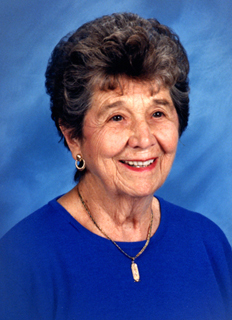Her life has been a medley with three themes—Family, Community and Music
by Ann Duecy Norman
What was amazing was that she got the job.
Grace Wilcox had just graduated from college. Her dream was a career in music. She’d starred in college musicals and won vocal competitions. She’d been the featured vocalist on one of the new live music request programs, broadcast via radio, the cutting edge communications technology of the day. But it was 1930, The Great Depression was eroding employment, and there were few jobs in her field. She had no teaching experience, but when she’d heard the Arlington School District was about to hire its first Music Supervisor, she’d sent her resume and a plan.
Music Supervisor was an enviable position, and it paid well. Her $100 a month salary was more than that of most women, including experienced classroom teachers. She spent her mornings teaching in the district’s seven grade schools and her afternoons experimenting with ways to capture the attention of bored rural high school students.
Grace was up to the challenge. She’d grown up on a farm with parents who had a passion for music. They’d made sure that their five children not only fed the chickens and attended the one-room school, but also took turns cranking the Edison phonograph while the family listened to classical records. Grace’s favorite times were the evenings when her family gathered around the piano and sang, and she hoped to inspire a similar love and knowledge of music in her students.
When she’d figured out that participating in regional music competitions sparked student interest, she’d felt she was making progress. As it turned out, her most difficult problem was not with the students, it was in dealing with one man—the high school principal. He felt musical competitions were a waste of time and, although the school district transported athletes to sporting events, he drew the line at transporting vocalists. Her selection of a Native American for the high school quartet had provoked even more strenuous objections. “Keep him down where he belongs.” he had insisted. When no one would support her in challenging him, Grace quit arguing and simply ignored him. For the most part her strategy was successful. The talented minority student was the star of the high school quartet. Parents provided transportation. The quartet won first place and the girl’s glee group placed second. Although the principal got his revenge by ignoring their victory and refusing to display the pennants they won, there were consolations.
Grace enjoyed teaching, had a growing circle of friends, and was dating some interesting fellows. Then she met Howard Bargreen. She was enchanted. So was he. According to Bargreen family lore, when Howard arrived home after their first date, he awakened his mother, showed her a picture of Grace, and said, “Look, this is the woman I am going to marry.”
Grace and Howard were engaged that spring, but for Grace, their relationship posed a painful dilemma: at that time, married women were not allowed to teach. It was a difficult decision, but romance prevailed. They were married in the summer of 1931.
Once the honeymoon was over, Grace was, in her words, “bored to tears”. Howard worked all day, and although she was pleased that his friends invited her to their teas and luncheons, she did not intend to fill her days with social functions. Did women attend these affairs, she wondered, “just to be busy”. Then, as if in response to her wishes, she received a telephone call offering her a part-time position as a vocalist in Seattle. She was elated, but Howard asked her not to accept it. “I’m afraid we’ll drift apart,” he had told her. Like her mother, when faced with a decision in which her desires differed from her husband’s, Grace chose the latter.
A few months later she became pregnant, and disappointment was replaced by delight. For Grace, parenting was rewarding, and household management became her occupation. “Instead of going out on my career,” she says, “I had four children.”
In time, she found other ways to pursue her love for music. She joined the Ladies Musical Club of Seattle and participated in an Everett women’s group that performed “Musical Readings” at social events and fundraisers. As she describes her life, it is clear that her participation in these activities was one of the keys to her happiness. As she says, “It let me sing.”
Once the children were in school, Grace began to address community problems. Throughout her life, she contributed in numerous, creative and often unsung ways, leading campaigns –sometimes clandestine, sometimes overt –to address needs ranging from passing school tax levies to clothing low income children, helping found a guild to support Children’s Hospital, and –along with her friend Neva Stuchell—successfully plotting to assure that Camp Fire girls got a much needed lodge.
Grace typifies her relationship with Howard as a partnership. “We were so different in many ways,” she says, “but we were a good pair.” He was a successful entrepreneur, served as a state senator for sixteen years, and played a major role in organizing the 1962 World’s Fair. She was the traditional homemaker and community volunteer, providing the support he needed for his successful career, and, from time to time, contributing in other ways. For instance, when the position of personnel director for merchandising at the World’s Fair was unexpectedly vacated, he turned to her to fill it. She enjoyed the challenge, but notes that her “working wardrobe” always included a couple of cocktail dresses hanging from a hook on the back of her office door. It is perhaps a metaphor for her life that when evening came, she easily made the transition from marshalling a diverse army of workers to being a supportive spouse, accompanying her husband as they entertained visiting dignitaries from around the world.
Grace’s life has been a medley composed of three themes: family, community and music. She experienced both great good fortune and profound personal tragedy. Her daughter, Teddy, a talented professional photographer, was killed in a tragic accident. Howard passed away. Shortly after that, her son Sam, died. Following these losses, and perhaps as a way of coping with them, her community volunteer role became more than a full-time job—it consumed her life. But, as she explains it, one day, she experienced a conceptual breakthrough. She realized she wanted more time with her family, she said “No” to volunteer activities, and, as she puts it, “I took up golf.”
 While she occasionally sounds wistful when she talks about the musical career she didn’t pursue, Grace is quick to say, “I’ve no regrets. It’s been an interesting life.” However, as she talks about her granddaughters’ lives, she applauds their greater freedom to combine professional and family life, while also recognizing the extraordinary personal effort that choice still entails.
While she occasionally sounds wistful when she talks about the musical career she didn’t pursue, Grace is quick to say, “I’ve no regrets. It’s been an interesting life.” However, as she talks about her granddaughters’ lives, she applauds their greater freedom to combine professional and family life, while also recognizing the extraordinary personal effort that choice still entails.
Having read Grace’s story, you probably won’t be surprised to learn that in 2002, a year after this interview, her son Howie reported that he and his mother had just completed a round of golf, that she had recently remarried, and that at the age of 94, she was beginning a new chapter in her remarkable career.
Sources:
Interviews with Grace Bargreen, September 2001
Videotape, Greater Everett Community Foundation, recorded September 2001
Conversations with Grace’s son, Howie Bargreen, September 2002; February 2007
Phone conversations with Grace Bargreen, January and February 2007
WLP Story Number 31 ~
© 2007 Ann Norman All Rights Reserved
